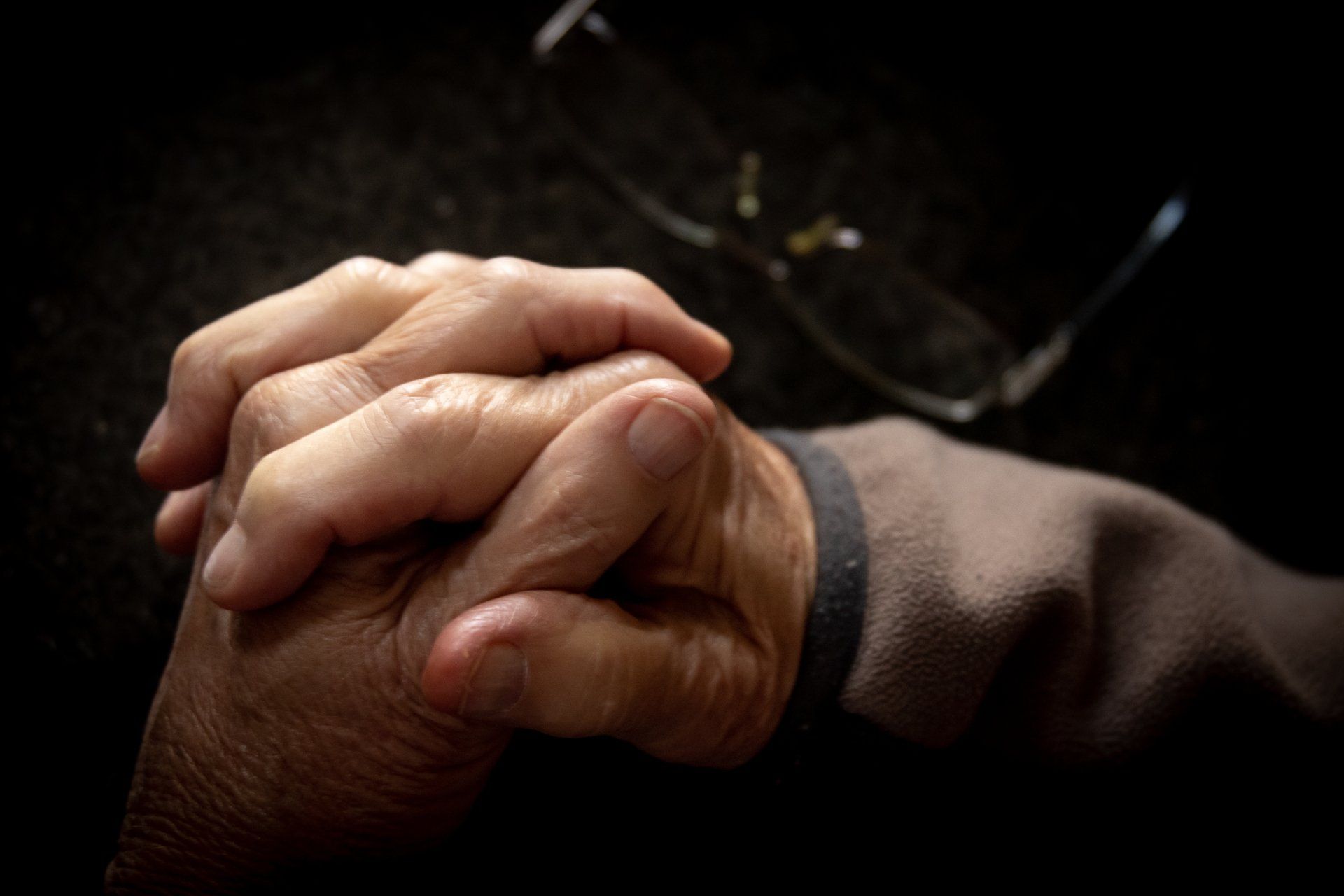I Will Never Leave You
I will never leave you, says the Lord.
Gen 3:6-11 NIV When the woman saw that the fruit of the tree was good for food and pleasing to the eye, and also desirable for gaining wisdom, she took some and ate it. She also gave some to her husband, who was with her, and he ate it. (7) Then the eyes of both of them were opened, and they realized they were naked; so they sewed fig leaves together and made coverings for themselves. (8) Then the man and his wife heard the sound of the LORD God as he was walking in the garden in the cool of the day, and they hid from the LORD God among the trees of the garden.
(9) But the LORD God called to the man, "Where are you?" (10) He answered, "I heard you in the garden, and I was afraid because I was naked; so I hid." (11) And he said, "Who told you that you were naked? Have you eaten from the tree that I commanded you not to eat from?"
This passage in the book of Genesis is referred to as the Fall, or the Fall of man. What a tragedy. God had created man in his own image and likeness. Had provided for their every need. Adam was the world’s first Gardner and Eve his helper. They went about tending to the garden, without a care in the world, naked as jaybirds, and never gave it a second thought. Then the tragedy struck.
One day they forgot who God was, they forgot who they were, and they went to try to improve on their already perfect lives. The believed that God had lied to them and that they were not who He said they were. God could not be trusted so they would have to depend on themselves in order to survive. They do what God told them not to, and immediately they realised that they had done wrong. Then they hid and covered themselves hoping that this would protect them and help them in some way to make up for the wrong they had done, and if they did he would be gracious to them.
In our own foolish minds, we may think that because we have been faithful to the Lord in some way, he will help us, he will be with us, he will never cast us out. Nothing could be further from the truth. While it is true that God is our help, that he promises to be with us always, that he will never forsake us or cast us out, this is only true because God said so, not because of anything we have ever done to deserve it. The problem with believing that God’s love, his mercy and his faithfulness to us are based on our performance is this, we don’t always perform well, and when we don’t, then we won’t believe that God can be with us, that he can help us, and instead we may very well believe that he will forsake us.
We have often head this; “If you think God is far away, ask yourself who moved.” However, there is a major flaw in this statement. Even though there may be times when we feel God is far away, He has not moved, and he never will move, his is as near to us as when we first came to know Him. In fact, He says in many places in scripture that he will never leave nor forsake us, and even if he only said it once, that ought to be enough. We cannot move away from God, because He is in us, we can only feel removed form God. Why then do we sometimes feel the need to continue in this performance-based relationship with God. I want to look at three probable answers to this question.
1) We don’t really know the character of God
2) We don’t really know who we are to him
3) We believe that God has plans to punish us or desert us when we sin
When God created man, He gave him all he would ever need for life and for godliness, and he lacked no good thing. He gave him free will, and to test his love for him, God gave man one command, and of course he failed the test miserably. Adam and Eve weren’t evil at first, but they were tricked into believing that God didn’t care for them and was holding something back from them, so they stole from God.
The very moment man broke God’s command, he forgot what God’s character was, he forgot who he was, and he believed that God planned to punish him and to reject him. This is why they hid from God in the garden. While we know that man was destined to live forever on earth, that day his destiny changed, and death reigned. But did God’s character change.
No, God came looking for man and found him hiding. Yes, there were consequences for his actions, but the first thing that God did was to cover the sin of man by killing one of the animals he created to make coverings for Adam and Eve. This was a symbol of what God had already put in place for man’s sin, Jesus, the Lamb of God, slain as it were, at the very foundation of the world. The world was founded on Christ and his sacrifice, and the church today is built on Christ as the firm foundation, the chief cornerstone. Just as God made a covering for the sin of Adam by killing a lamb, Jesus the Lamb of God is a covering for ours, not only that, but He is God’s Lamb who takes away our sin.
God so loved the world that he gave his only begotten Son, that whoever would believe in Him would never perish but have everlasting life. Adam and Eve were included in this love God has for the people of the world. When they sinned, they didn’t stop being loved by God, but they no longer believed it, so they hid from God. Adam’s sin made the nakedness of his body something to be ashamed of, but the real shame was that his soul has lost its glory, the purity and holiness had been taken away, and he could not appear before a pure and holy God.
We do that too. Whenever we get to feeling that God loves us because of our performance, and then we fall short, we tend to hide from God, or at best we stop believing that he still loves us as much. This may come in the form of lack of faith in God, we stop worshipping God, we stop depending on him or we stop meeting with God’s people. In the garden, man, in his efforts to become more like God sank into a state of great wickedness. We would never do that, you say, but whenever we try to do something to gain favour with God, we are trying to be more like God.
Whenever we feel that we must perform to gain his love or acceptance, we are attempting to become more like him in our own strength, and we forget that he already loves us and accepts us just as we are because of the sacrifice and the blood of Jesus. Anytime we fall into this performance-based relationship trap, we show that we have indeed forgotten what God’s character is and we have forgotten who we are to Him. Like Adam and Eve, we hide from Him in shame
When God came looking for man in the garden, Adam’s excuse was that he was afraid because he was naked. Adam was naked from the very first day that he was created, and he was never afraid or ashamed until now. The real reason he was hiding was because of his sin. He had sinned against God, and he knew that the punishment for his sin was death. He may very well have believed that if God found him, he would kill him on sight, but he didn’t know that God had no intention of killing him in a physical sense. The death penalty for sin was not just physical death in the fullness of time, but spiritual death in separation from God forever. But their fear was very real. The first fruit of sin is shame and fear, and whenever we sin by believing that we are not loved unconditionally by God, we will hide away in shame and fear.
Eve ate from the tree of the knowledge of good and evil, thinking that she would become more like God. We too eat from that tree whenever we think that by doing good and staying away from evil we can somehow become more like God. The moment we believed the good news of the gospel, God put His Spirit in us, and now we live by faith, not our faith in God, but the faith of His Son Jesus, the One who now lives in us.
Any attempt to become more acceptable to God by performance makes a mockery of the performance of Jesus on the cross. God loves us just the way we are, and as we allow His life to be lived out in us, we will become more like him every day. But it will Christ in us, it will be his life in us, not us trying to become more like Him.
Why do we struggle so much with our identity and with God’s character. Why do we fear God so much, why do we fear punishment so much. We are so bombarded each day with conditional love that it can be hard for us to understand the unconditional love of almighty God. Not only do we have difficulty understanding unconditional love because of our life’s experiences, but we have an added difficulty in the form of an enemy who wants to convince us that God will only love us and care for us when we live our lives pleasing to him. When he manages to convince us of this, he is quick to remind us that when we sin, we fall short of the glory of God, and so God cannot be pleased with us. It would follow then, according to our life’s experiences, that when someone is not pleased with us, they will not love us until we have done some good thing to make up for our wrong.
What we forget is that first of all Jesus did all the making up that was necessary for all the wrong that we have done. And if he hadn’t, then no amount of good could ever make up for any wrong we did. And secondly, because Jesus was punished for all our sin, God no longer keeps a record of our wrongs, so there is nothing to make up for. Boy, can we become so confused. The truth is, God absolutely loves us when we are good, when we are very good, and when we are so bad that we are horrid.
Even if we walk away from God and all his plans for us, he will never let us walk alone, he will always hold our hand until the day we meet Him face to face.










